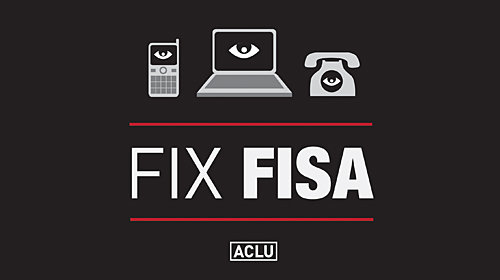
Most of the attention on Attorney General Eric Holder's speech earlier this week has focused on his attempted justification of the government's policy on the targeted killing of U.S. citizens (you can read our reaction here). But also important (though mostly overlooked) was his brief but spirited defense of the most sweeping surveillance law ever passed by Congressāthe FISA Amendments Act.
Enacted in 2008, the FISA Amendments Act allows the government dragnet access to our international communications without warrants, without any suspicion of wrongdoing, and without ever identifying the targets of its surveillance to a court. And it authorizes that unprecedented level of surveillance without meaningful judicial oversight. To be sure, the Foreign Intelligence Surveillance Court (FISA Court) plays a role under the law, but that role is extremely limited. The FISA Court does not review individualized surveillance operations. It reviews only the broad "targeting" and "minimization" procedures used by the government.
Despite these flaws in the FISA Amendments Act, Attorney General Holder defended it for its "comprehensive regime of oversight by all three branches of government."
That particular defense caught us by surprise. Not for what Holder said, but for what he neglected to mention.
Less than an hour after the law was passed, we filed a lawsuit challenging its constitutionality on behalf of a coalition of human rights groups, activists, journalists, and lawyers who write about or represent individuals likely being targeted by government surveillance. Their work requires that they communicate confidentially across international borders, but since the law's passage, they've been forced to incur significant travel expenses to have those private conversations in person.
Since the very beginning, however, the Justice Department has argued that our clients lack standing to challenge the FISA Amendments Act because they cannot prove that their communications were or will be intercepted. But, of course, the government categorically refuses to supply that information.
An appeals court rejected the government's cynical argument, allowing our suit to go forward, but Holder's Justice Department recently asked the Supreme Court to reverse that decision. If adopted, the government's argument would have the effect of insulating the FISA Amendments Act from judicial review.
The irony should be clear. Just weeks after Justice Department lawyers asked the Supreme Court to effectively keep the courts from examining the FISA Amendments Act, Attorney General Holder argues publicly that the law is constitutional because it is overseen by all three branches of government.
If the FISA Amendments Act is as clearly constitutional as Attorney General Holder believes it to be, why not let the courts review it?
Learn more about surveillance: Sign up for breaking news alerts, , and .

